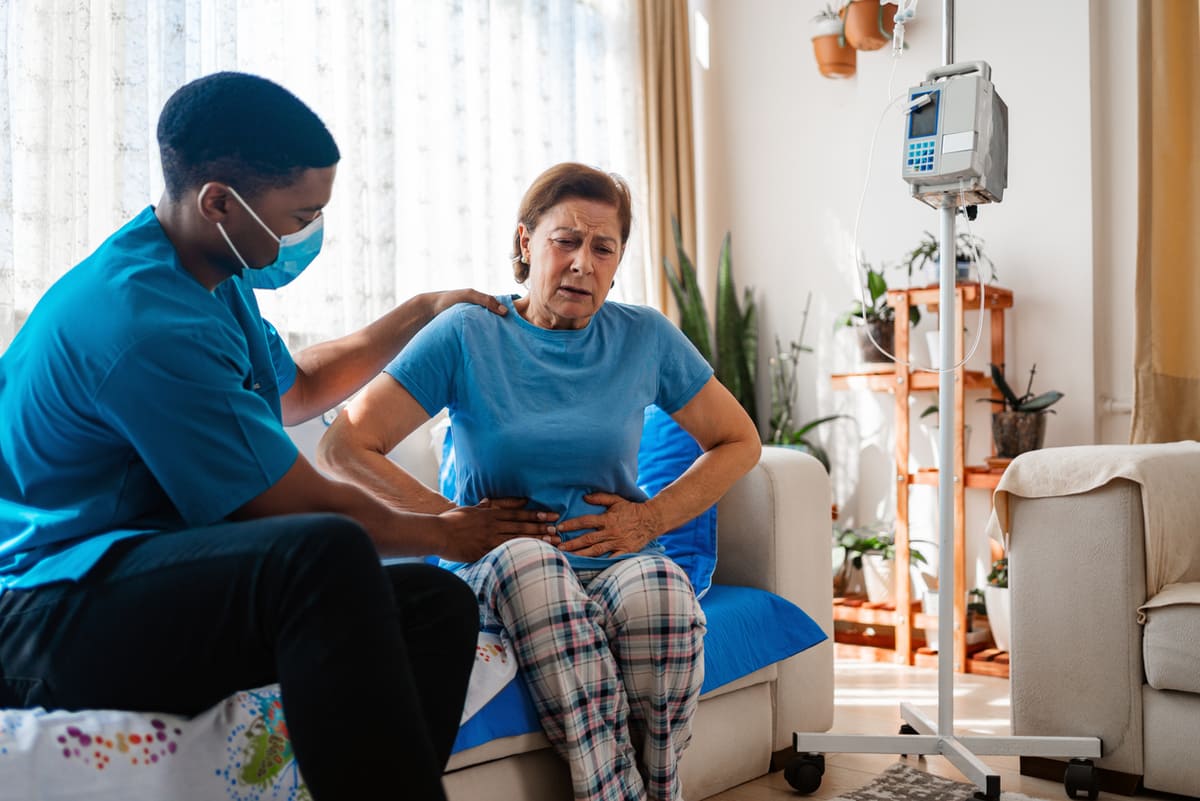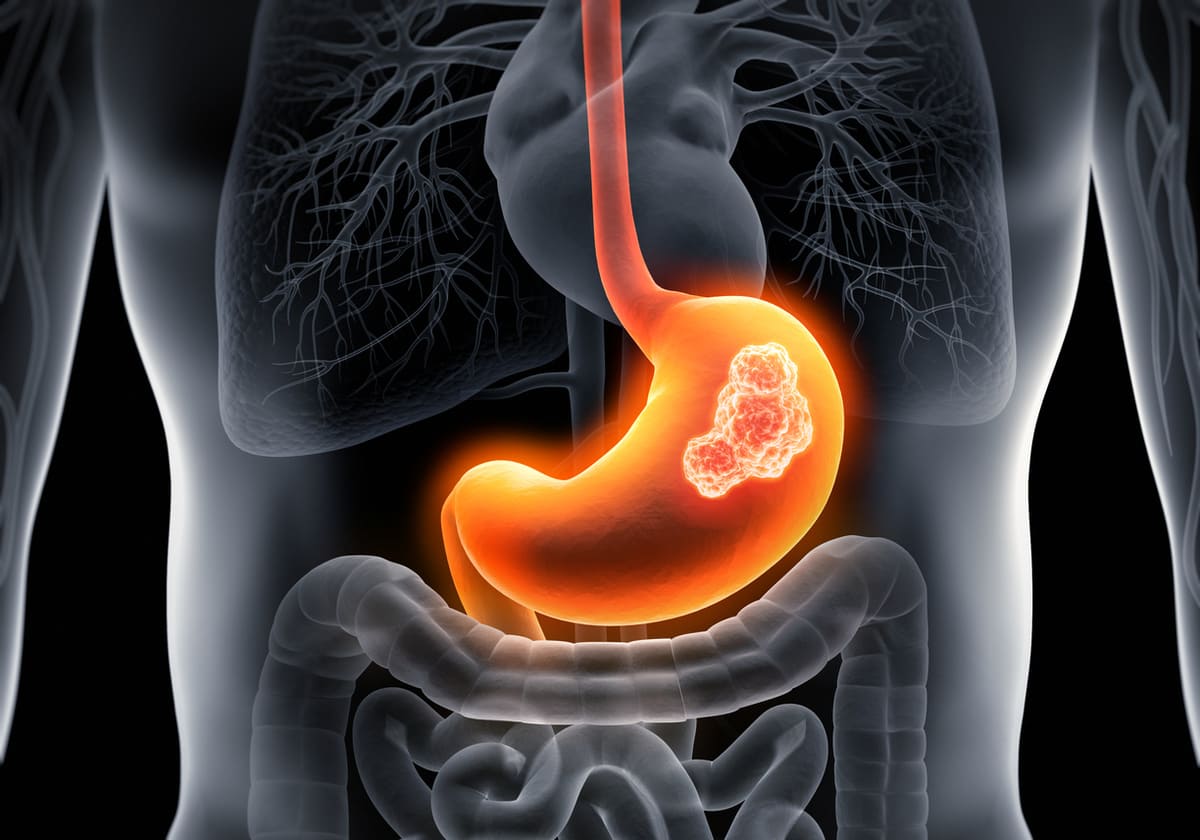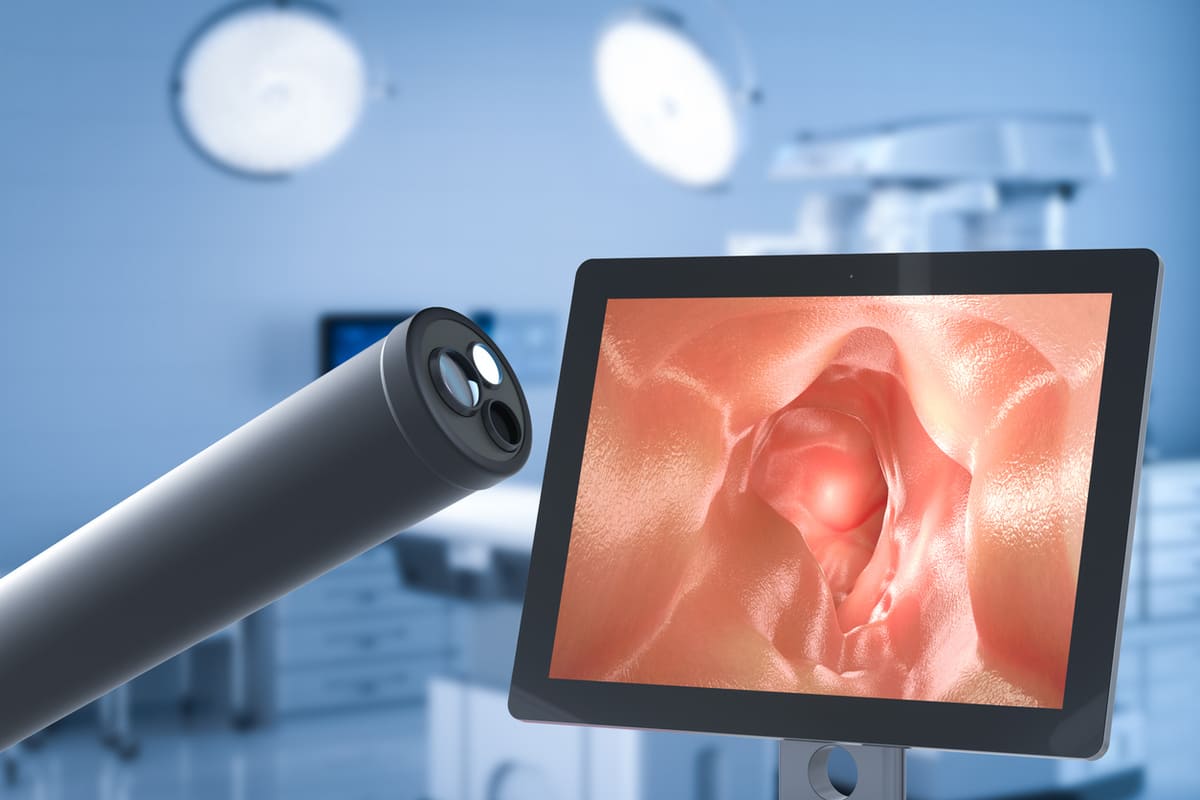Cancer, a disease caused by uncontrolled cell division and growth, can start in and affect any part of the body. Aggressive cancers, or cancer that is untreated can spread to other parts of the body, invading and destroying normal cell tissues. Stomach cancer, also known as gastric cancer, while rarer than breast, prostate, or lung cancer, is the fifth most commonly diagnosed cancer worldwide and accounts for 1.5% of new cancers diagnosed in the United States.
Risk Factors
The causes of stomach cancer are not well understood, but several risk factors have been identified. Those over the age of 55 are most likely to develop gastric cancer, and it affects more men than women.
Being infected with Helicobacter pylori bacteria is strongly associated with both triggering stomach cancer and promoting its growth, especially if the infection is ongoing. Many people acquire an H. pylori infection in childhood. When they occur, symptoms include nausea, loss of appetite, bloating, frequent burping, and stomach pain that increases when the stomach is empty. As not every infected individual experiences symptoms, some may never even realize they are infected. Fortunately, H. pylori can be eradicated using many common antibacterial medications.
A family history of gastric cancer can also indicate a higher possibility of developing stomach cancer, as can certain conditions, including some types of anemia, particular gastric polyps, and genetic disorders like Li-Fraumeni syndrome. In addition, lifestyle choices can affect your chances of developing stomach cancer. A diet high in sodium and processed foods and low in vegetables can increase your risk. Smokers are also more likely to develop stomach cancer than non-smokers, as are people who regularly drink alcohol.
Symptoms

The early symptoms of stomach cancer are mild and often easy to mistake for other conditions. As the disease progresses, the symptoms get more pronounced and more difficult to ignore.
Early symptoms include:
- Frequent heartburn
- Trapped gas, bloating, and frequent burping
- Feeling excessively full after eating
- Persistent stomach ache
- Fatigue
- Weakness
Additional advanced symptoms can include:
- Black or bloody stools
- Loss of appetite
- Unexplained weight loss
- Increasing stomach pain
- Vomiting blood
- Trouble swallowing
Although symptoms are somewhat vague in the early stages of the disease, they should not be dismissed. Stomach cancer is fairly treatable if caught early, and 75% of those diagnosed before the cancer cells extend past the stomach have a 5-year relative survival rate. Once it has spread to nearby parts of the body, that survival rate drops to 35%. The 5-year survival rate is just 7% when it spreads to distant body parts.
Diagnosis

While screening for stomach cancer is available, it is not generally recommended in the United States unless someone has either symptoms or risk factors for stomach cancer. In these cases, your doctor may advise you to consult with a specialist known as a gastroenterologist. Tests that a gastroenterologist may suggest include:
Upper Endoscopy
An endoscope is a thin, lighted tube with a camera that is used to perform an endoscopy. It can be passed through the mouth and down the throat to the esophagus, giving your doctor a better view of your gastrointestinal system and an opportunity to check for growths or abnormal cells. Endoscopes can often take tissue samples, either to check for infections or to biopsy any growths, and sometimes can even be used to remove smaller tumors. Most people are sedated when given an endoscopy.
Upper GI Series/Barium Swallow
The patient is given a liquid containing a silver-white metallic compound called barium. Once the solution has coated the esophagus and stomach, an X-ray is performed that allows the doctor to evaluate the gastrointestinal system.
CAT Scan
Also known as a computer tomography scan, this procedure employs a computer linked to an X-ray machine that creates a 3D view of the tissues and organs. In order to allow tissues to show up more clearly, a specialized dye may either be swallowed or injected into a vein.
Biomarker Testing
A type of analysis that examines the makeup of the cancerous cells. Biomarker testing helps determine the best treatment plan to eradicate cancers of the gastrointestinal tract. It can track gene changes, stability, and the chemical makeup of the affected cells.
Laparoscopy
A surgical procedure in which small cuts are made in the wall of the abdomen, and a thin, lighted tube with a camera is inserted to view the stomach lining. These incisions can also be used to excise tumors and growths if found.
Treatments
Several treatments are available to help defeat gastric cancer once it is diagnosed. The type of treatment that you and your doctor ultimately choose will depend on several factors. Your personal treatment plan will likely be based on components like what type of cancer has developed, where the cancer cells are located, the stage of cancer, and the patient’s overall health. Each of these treatments may be used individually or in combination with one another.
Treatment options that may be considered include:
Endoscopic treatments

Endoscopes can be fitted to treat stomach cancer as well as diagnose it, especially in the earlier stages. A mucosal resection can remove abnormal cells and very early-stage cancer from the lining of the digestive tract. For endoluminal laser therapy, a laser is attached to the end of an endoscope to slice open a blockage in the gastrointestinal system.
Stent placement
To bypass a tumor that is blocking passage either into or out of the stomach, surgeons may opt to insert a thin, flexible tube called a stent that can expand to allow the passage of food.
Surgical removal
Surgery to remove all or part of the stomach is called a gastrectomy. When only a part of the stomach is removed, it is a subtotal gastrectomy, whereas a total removal of the stomach and nearby lymph nodes is known as a total gastrectomy. A gastrojejunostomy is the removal of a portion of the stomach that is blocking the access of food into the small intestine.
Chemotherapy
Chemotherapy drugs, either taken orally or by injection, are used to eradicate fast-growing cancer cells. Unfortunately, these medications can also harm healthy body cells in addition to the cancer cells, commonly causing unpleasant side effects.
Radiation
Radiation therapy can keep new cancer cells from growing and kill established cancer cells. Like chemotherapy, this treatment frequently leads to significant side effects.
Targeted Therapy
In some cases, certain substances or medications can target the cancer cells. Biomarker tests will help your doctor predict your response to targeted therapy. Immunotherapy is a targeted therapy that uses drugs to encourage an individual’s own immune system to fight the cancer.
In Short
This disease is relatively rare in the United States compared to other types of cancer, such as breast, lung, or colon, but it’s essential to know the risk factors and symptoms related to this disease. Although there is no guaranteed way to prevent stomach cancer, there are several actions you can take that appear to reduce the risk of developing it. These include:
- Avoid excessive salt intake.
- Avoid or limit alcohol.
- Avoid smoking tobacco
- Eat plenty of fruits and vegetables
- Get regular physical exercise
- Maintain a healthy weight
- Treat infections by H. pylori
If you develop symptoms of stomach cancer, especially if you are at higher risk due to disease, lifestyle choices, or a family history of gastric cancer, consult with your doctor right away. Stomach cancer survival rates are much higher when the cancer is caught before it spreads to other parts of the body.
Since 2010, November has been deemed Stomach Cancer Awareness Month, with a focus on raising both funds for stomach cancer research and public awareness of the risk factors, prevention, and detection methods related to stomach cancer. However, that doesn’t mean we don’t have to be diligent all year long. Taking preventative measures and early detection can help keep you on the path to a better and healthier you.
Read Next:
Common Myths and Realities about the Causes of Breast Cancer







